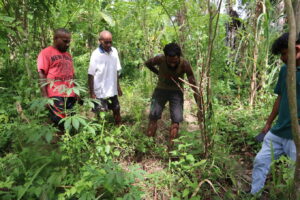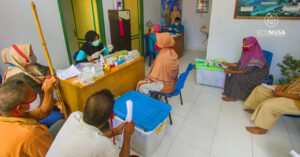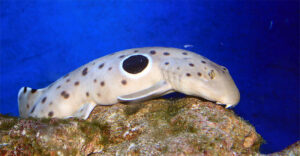
On 5 November 2020 morning, when roosters and birds hailed the dawn, at a house on the road with reef and pebble someone shouted, “Rai neroakh berut rae megasbo!” It means: “Let us assemble together!”
That call could attract Rufases villagers to get together and walked to Seya Village. Both villages are close neighbors. That day, at 10.00 there were a social event held by EcoNusa COVID-19 Response in front of the Seya Village Head. Both villages have tradition to yell as a public call instead of using a loudspeaker.
The two are new villages in Mare District, Maybrat Regency, in West Papua. Having spatially planned since 2010, both villages were established in 2015 using the village fund. It was not an easy struggle for the pioneers to build the villages. These communities used to be nomadic by moving more than 10 times. The last spot they moved prior to their current dwelling was too small in size and prone to landslide.
Read also: Listening to the Community, a Key Driver for Environmental Change
A noted village figure, Moses Nauw, said that one of the reasons to opt for the current dwelling was due to historical reason. “Formerly, the evangelization from Ayamaru went to this place. For the reason, we are back to build this land,” he said. It also becomes their reason that it is only about 3 kilometers away from the water spring. But, to meet their daily need of water, the local peoples rely on the sky. Therefore, nearly all houses have tarpaulin for rainwater catchment.
Hilly topography of Mare District has made the village hard to access. One should go through muddy dumps with steep ascent or descent. Only four-wheeled drive vehicle could go back and forth the village. It takes 8 hours from Sorong to reach Mare District. The car rent is exorbitant or IDR5 million to go back and forth.

Moses Nauw opened the event while giving knowledge to the community on EcoNusa and the agenda.
“Once I search EoNusa through Google and I observe it is very good for us in the village. They come here to motivate and provide assistance to farmers. So, we as a community should be the driver to do something,” he said.
Read also: Prevailing the Last Hope in Gane Dalam
Around 30 villagers listened to Utreks Hembring as a farming mentor form EcoNusa COVID-19 Response. Utreks explained about effective land cultivation, seed optimization and pests control.
From the discussion, it was known that the community often does nomadic farming. They several times failed their crops due to pests. They have planted multi-culture plants ranging from local plants such as sweet potato, cassava, banana and other plants with imported seeds such as mustard green, tomato and chilly. When doing farming, they disseminate the seeds and just wait for the yield.

The participants were so enthusiastic to know the expedition team handing over some assistances such as vegetable seeds, organic fertilizer and farming tools such as hoe and sprayer.
As to Beyum Antonela Baru, a volunteer who has worked together with the local community in Mare District for 18 months, the existing of seed plants are very helpful. As to her, they are in the planting season and the seeds from EcoNusa would be harvested by Christmas.
Editor: Leo Wahyudi & V.A Wulandani




